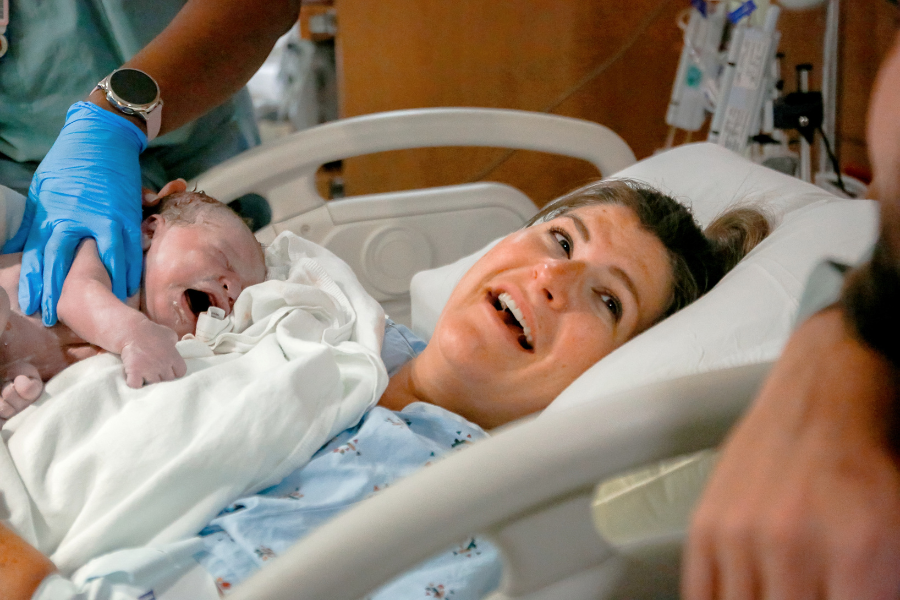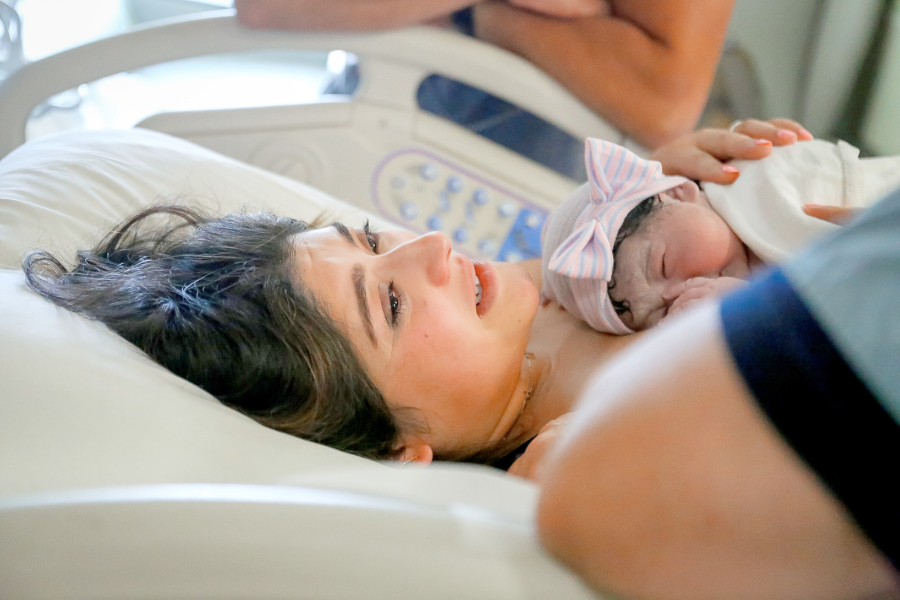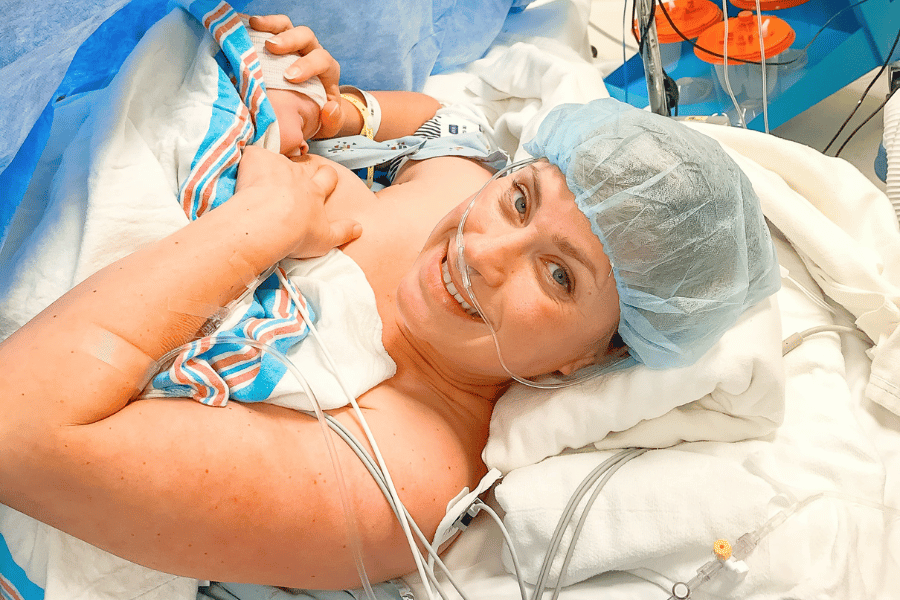Mama, I see you. Those first few weeks and months after having a baby can be a whirlwind of joy, exhaustion, and a whole lot of emotions.
If you’re feeling more down than up, and those baby blues just won’t seem to fade, please know that you’re not alone.
Postpartum depression (PPD) doesn’t discriminate, it’s a common mental health condition that can affect anyone. It’s important to be open and honest with your provider and your support people.
PPD is serious, but that doesn’t mean you have to suffer alone. There are lots of resources out there to help you.
Follow @mommy.labornurse on Instagram to join our community of over 650k for education, tips, and solidarity on all things pregnancy, birth, and postpartum!
Before I dive into postpartum and what it actually is, I need to communicate something very, very, very important to you. If you ever have thoughts of harming yourself or your baby please tell someone ASAP!
If you feel like you don’t have anyone to tell call or text the National Maternal Mental Health Hotline at 1-833-852-6262 for free, confidential support 24/7.
The hotline is available in English, Spanish, and over 60 other languages.
What is Postpartum Depression?
Postpartum depression is a severe form of depression that starts after giving birth. PPD can start at any point within the first year of baby’s life, however, most women are affected within the first few months.
PPD is also known as “smiling depression”. Often women suffering from PPD appear to be happy and smiley on the outside but are really struggling on the inside.
Signs of postpartum depression
Postpartum depression might look different on everyone, but there are some common signs to look out for:
- Difficulty bonding with baby
- Crying a lot
- Difficulty sleeping or sleeping too much
- Feeling hopeless
- Withdrawing from family and friends
- Lack of interest in things that used to bring you happiness
- Inability to think clearly and make decisions
You might experience some of these symptoms or you might experience all of them. I know there is often some negative stigma surrounding mental health (we’re working really hard to change that).
But it is SO important to be open and honest with your support system and your medical provider about how you’re feeling.
There is hope for you, there is a light at the end of the tunnel, and you don’t have to suffer alone.
Postpartum Depression tips
I’m no expert, but I am a mama and I have personally experienced postpartum depression and postpartum anxiety.
Based on my personal experience, here are some tips you might find helpful. Remember, you aren’t alone and you will get through this, mama.
1. Talk, talk, talk
Communication is key! This holds true for pretty much every aspect of life and is the foundation of healthy relationships. Find your person, or persons, and share what you are feeling with them.
Postpartum depression is nothing to be ashamed about. Sharing your feelings with someone you trust and feel comfortable with can be so tough but also can offer so much relief too. Talking about your feelings is noble; it might help other mamas suffering from PPD as much as it helps you.
Of course this is only one of the many tips to cope with postpartum depression. Some people don’t find it helpful or therapeutic to talk about their feelings. If this is you, I encourage you to open up to just one person.
It could be your partner, your best mama friend, or your provider. Keeping your feelings bottled up can hinder the healing process, you just never know the relief you might receive by opening up.
2. Self care!
Making self care a priority when you have a newborn sounds like trying to find a needle in a haystack…an impossible task. I’m here to encourage you to do whatever you need to do to carve out at least 10 minutes, but hopefully more, a day to do something for yourself.
Take a quick walk around the block, pull out that book you’ve been trying to finish for months, put on some music and take a warm shower, or simply stretch. Whatever self care looks like to you, mama, you deserve a little you time.
Taking care of yourself isn’t a luxury, it’s a necessity. It’s an investment in your well-being and your ability to be the amazing mama you are. So please, don’t feel guilty for prioritizing yourself. You deserve it, and your little one will benefit too!
3. Move that beautiful bod
You’ve just accomplished something incredible – bringing a new life into the world! Your body is amazing, and it deserves some gentle love and movement as it recovers.
Exercise isn’t about weightloss at all in this case, it’s about boosting your mood, reducing anxiety, and reconnecting with your strength.
Don’t underestimate the power that exercise can have on your mood! It’s no secret that exercise releases endorphins. Endorphins are chemicals in your brain that can give you that temporary euphoria you get when laughing with a good friend or listening to music you love.
When you exercise, even just a short walk or some gentle yoga, your brain releases those endorphins, leaving you feeling happy. Keep in mind that your body is still in recovery mode and might need some time to get back in the groove.
Start with a slow walk through the neighborhood and gradually work yourself up.
4. Nourish yourself
Your postpartum self needs nourishment in every way imaginable. For 9 (give or take) months your body has been growing, feeding, and nourishing new life. And if you are breastfeeding then your body is continuing to do so.
It’s time to nourish your own self a little bit now, mama. Nourishing yourself can have a huge positive impact on your mental health.
Think of it as giving your body and mind a warm, loving hug. It’s more than just eating healthy and getting rest; it’s about refueling your tank so you have the strength to cope with the emotional rollercoaster of new motherhood.
Let’s get more specific about how nourishment can help combat PPD:
- Boosts energy and mood: Proper nutrition provides the fuel your body and brain need to function optimally. When you’re running on empty, it’s harder to regulate your emotions and manage stress, making you more susceptible to depression. Eating balanced meals can help stabilize your blood sugar, improve your mood, and combat fatigue
- Supports hormonal balance: Pregnancy and childbirth cause significant hormonal fluctuations. These shifts can contribute to mood swings and emotional instability. Adequate nutrition plays a crucial role in supporting hormonal balance and reducing the risk of postpartum depression
- Improves sleep quality: We all know sleep is precious (and sometimes elusive) for new moms. Prioritizing rest and getting enough sleep can help regulate your mood and improve your ability to cope with stress. When you’re well-rested, you’re more likely to feel positive and less prone to feelings of sadness or anxiety
- Enhances self-esteem: Taking care of yourself sends a powerful message to your brain: “I am worthy of love and attention.” Prioritizing your needs, even amidst the demands of motherhood, can boost your self-esteem and help you feel more empowered
5. Find your (mama) tribe
Finding your tribe – those fellow mamas who truly “get it” – can be an absolute lifeline during this beautiful but sometimes overwhelming chapter.
Whether it’s an online group, a local support group, new friends you make at the park, or old friends walking alongside you, connecting with other mamas is so important and beneficial.
You just never know what another mama might be going through and what positive things can come from connecting and leaning on each other. Sharing your experiences and learning from other mamas who get it can be incredibly therapeutic and healing.
6. Consider therapy and / or medication
Making the decision to start prescription medication can be difficult for a lot of people. Unfortunately, the decision to take medication for mental health can be even more difficult.
Historically mental health and mental health medications have carried such a negative connotation but I truly think and hope that is changing.
Getting on medication was one of the best things I ever did for myself and for my kids. The postpartum anxiety I experienced after having my boys was almost debilitating. There were so many days that simply using the bathroom felt too overwhelming of a task.
I realize not everyone has the same experience but starting medication was life changing for me. It gave me back the ability to actually function as a human being again and be the mom I wanted to be for my boys.
It wasn’t medication alone that helped me get back on my feet, therapy played a huge role in the process as well. To this day, I am still in therapy, and can’t say enough about the positive impact it has had on my life.
I know the thought of spilling your life to a complete stranger might seem uncomfortable and daunting but take it from someone that has been there, you won’t regret it!
Additional Little Tips from the Heart:
- Accept help: Let others lend a hand. You don’t have to do this alone!
- Be patient with yourself: Healing takes time, mama. Don’t expect to feel 100% overnight
- Celebrate small victories: Focus on the positive moments, no matter how small
- Set realistic expectations: Don’t put too much pressure on yourself to be the “perfect” mama
How does Postpartum Depression differ from the Baby Blues?
I get asked this question a lot, “How do I know if I’m experiencing the baby blues or postpartum depression?”
If this is your first postpartum experience or you had a different experience the first time around you might find it difficult to differentiate between the two.
The biggest difference between the two is the length of time they last. Baby blues typically resolve, or at least start to resolve, about 2-3 weeks postpartum.
Postpartum depression continues well past this point and often begins to get worse around the 2-3 week mark.
There are other notable differences, which you can learn more about in the post below.
There is a light at the end of the tunnel, mama
If you’re struggling, please reach out to someone. It could be your partner, your provider, a mental health professional, or a friend, but let someone know how you are feeling.
There’s absolutely no shame in asking for help. In fact, asking for help is so brave and so noble, mama! If you are looking for more information to navigate this difficult time and journey please see the resources below. And remember, you aren’t alone.





